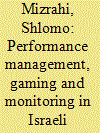| Srl | Item |
| 1 |
ID:
167149


|
|
|
|
|
| Summary/Abstract |
Recent comparative measures rank Israel very high on the innovation scale and note its preference for informal managerial practices. Based on a principal–agent analysis, this article explains that the economic and administrative systems in Israel have created the basis for the evolution of a managerial culture characterised by constant distortions and the gaming of performance information, lack of truthful reporting and improvisation. On the positive side, this managerial culture encourages innovation; on the negative side, it creates significant problems related to accountability, ethical conduct and overall managerial quality.
|
|
|
|
|
|
|
|
|
|
|
|
|
|
|
|
| 2 |
ID:
107915


|
|
|
|
|
| Publication |
2011.
|
| Summary/Abstract |
This article provides data and insights into Israeli public opinion about the welfare state and social policy. The study included 940 respondents who reported their attitudes towards various issues related to the welfare state. The study was conducted in spring 2008 prior to the current economic crisis. The findings show that, to a large extent, the Israeli public justifies state intervention in the supply of public services, supports public investment in services related to the welfare state, and recognizes the obligation to support those in need. As for various policy areas, the Israeli public regards education as a top priority, believing that investment in public education is likely to lead to achievements in other areas such as security and health. However, when asked about their willingness to pay more taxes for services related to the welfare state, respondents tended to be less enthusiastic. The research points to a significant gap between the social and economic policies in the past decade and the attitudes of large parts of Israeli society towards the welfare state. We provide possible explanations for that gap.
|
|
|
|
|
|
|
|
|
|
|
|
|
|
|
|
| 3 |
ID:
080671


|
|
|
|
|
| Publication |
2008.
|
| Summary/Abstract |
This article describes the impact of socio-political transformation processes on sport policy through the Israeli experience. A framework was developed for analyzing learning processes, utilizing the argument that under highly centralized systems, citizens' preferences regarding any area of life, including sport, are strongly affected by governmental policy. We show that in Israel the lack of a significant sport policy during the centralized formative years of the State influenced citizens' long-term preferences regarding sport, in the sense that it was regarded as a marginal issue that did not trigger demands for policy change. We explain that the marginality of sport in Israeli society also continued when the nature of relations between citizens and politicians was transformed from a top-down to a bottom-up orientation.
|
|
|
|
|
|
|
|
|
|
|
|
|
|
|
|